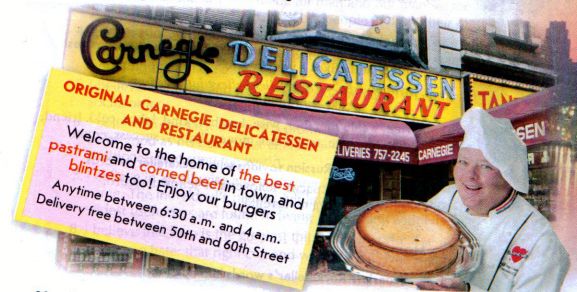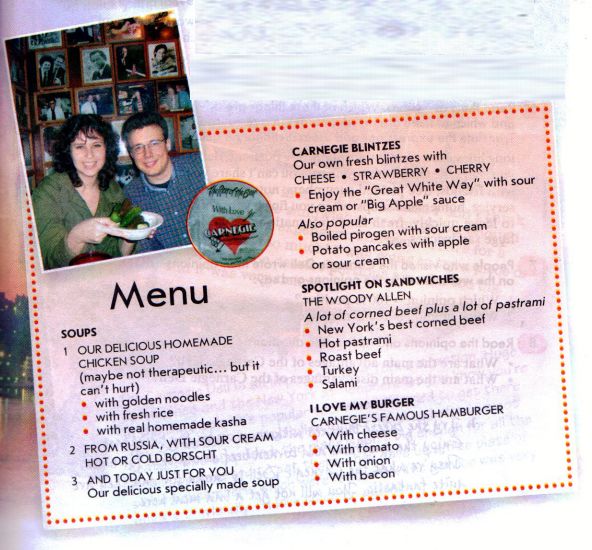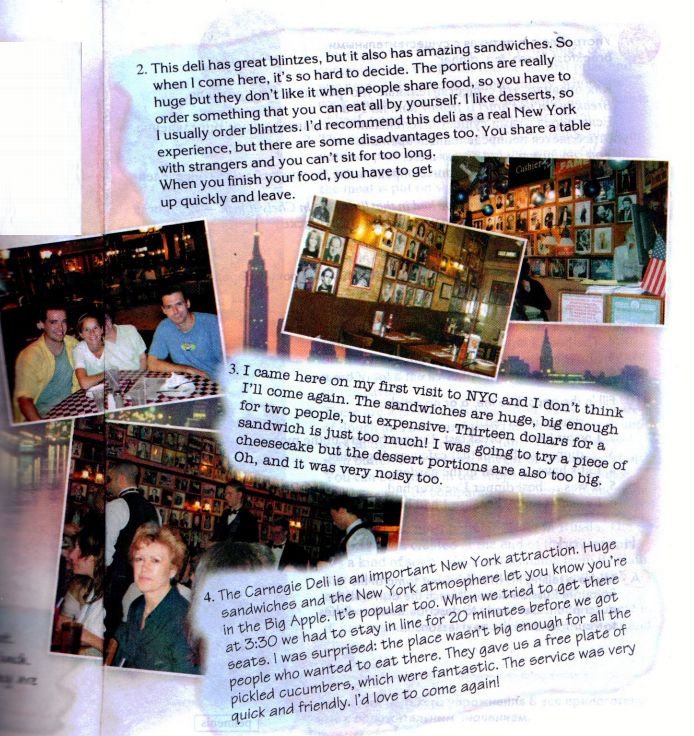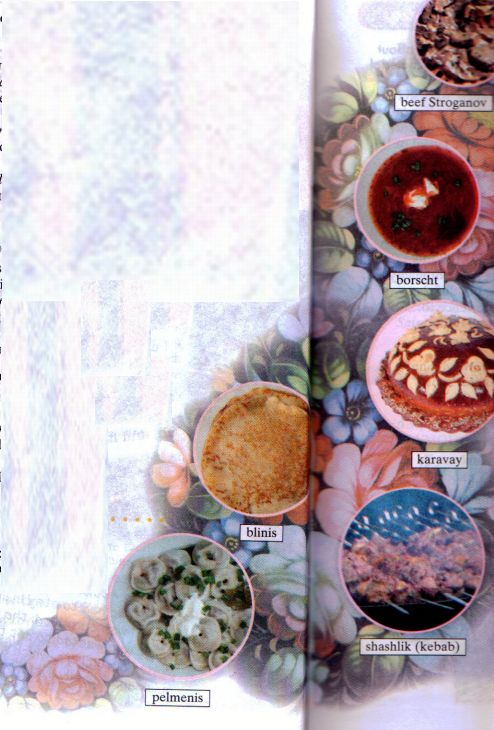|
|
|
| Строка 7: |
Строка 7: |
| | <br> | | <br> |
| | | | |
| - | [[Image:24-10-51.jpg]]<br><br>'''1 Listen to the conversation and read the text of it. What kind of restaurant does Olga want to go to? Find the best explanation for the word posh.''' | + | [[Image:24-10-51.jpg|460px|Have you ever tried blintzes]]<br><br>'''1 Listen to the conversation and read the text of it. What kind of restaurant does Olga want to go to? Find the best explanation for the word posh.''' |
| | | | |
| - | a) expensive<br>b) elegant and fashionable<br>c) fast food | + | a) expensive<br>b) elegant and fashionable<br>c) fast food |
| | | | |
| - | '''''Olga:''''' And now, let's have lunch. Are you guys hungry? Rob: Oh, yes. I like American hamburgers. They're great. Misha: And I'd like some borscht and pickled cucumbers. I know it's probably not possible, but I miss Russian food so much. Olga: I'll take you to a very popular place that's visited by every famous<br>person who comes to New York. Mark: Oh, please don't take us to a posh restaurant. I'm sure it'll be expensive.<br>Olga: Mind your manners, boys. Never argue with grandma Olga. Just<br>follow me and remember: New York has something for everybody.<br>'''<br>2 Listen to the words and expressions which are used to describe restaurants and repeat them after the speaker.'''
| + | '''Olga:''' And now, let's have lunch. Are you guys hungry? Rob: Oh, yes. I like American hamburgers. They're great. Misha: And I'd like some borscht and pickled cucumbers. I know it's probably not possible, but I miss [[Great_Russian_poets|Russian]] food so much. Olga: I'll take you to a very popular place that's visited by every famous person who comes to New York. Mark: Oh, please don't take us to a posh restaurant. I'm sure it'll be expensive.<br>Olga: Mind your manners, boys. Never argue with grandma Olga. Just<br>follow me and remember: New York has something for everybody.<br>'''<br>2 Listen to the words and expressions which are used to describe restaurants and repeat them after the speaker.''' |
| | | | |
| - | noisy, top quality, atmospheric, posh, expensive, friendly, popular, fast food, cosy, cheap, crowded, elegant, simple<br>'''<br>3 Olga and the friends arrive at the restaurant. Look at the pictures and say what kind of restaurant the Carnegie Deli is.'''<br><br>[[Image:24-10-52.jpg]]<br> <br>'''4 What do you think? Support your ideas with facts from the pictures.''' | + | noisy, top quality, atmospheric, posh, expensive, [[Computers_-_friends_or_foes|friendly]], popular, fast food, cosy, cheap, crowded, elegant, simple<br>'''<br>3 Olga and the friends arrive at the restaurant. Look at the pictures and say what kind of restaurant the Carnegie Deli is.'''<br> |
| | | | |
| - | 1. What are the people whose pictures you can see on the walls?<br>2. What does the word "deli" mean?<br>3. What is the short word for "hamburger"?<br>4. What is the girl in the picture eating?<br>5. Is the "deli" a Russian restaurant?<br>6. What kind of food can you get in this restaurant?<br>7. Will Misha, Mark and Rob find something that each of them likes in the deli?<br><br>[[Image:24-10-53.jpg]]<br><br>'''5 Look through the extracts from the menu and find as many Russian words and dishes as you can.<br>'''<br>[[Image:24-10-54.jpg]]<br><br><u>'''America in focus'''</u><br><br>'''''Deli'''''— Until the late 19th century, delicatessens were mainly owned by Germans, and later by Jews, too, who went into the business. The word itself comes from German and means delicacies, but it is used not only to describe the shop that sells the food, but also the products sold in the shop.
| + | [[Image:24-10-52.jpg|460px|ресторан]] |
| | | | |
| - | '''''Corned beef'''''— In the 19th century butcher shops which sold meat closed every weekend. Butchers had to keep the unsold meat fresh for two days. There were no refrigerators at that time, so some butchers had the clever idea covering meat with salt. The grains of salt were called "corn" in England, so the meat got the name "corned beef". | + | <br>'''4 What do you think? Support your ideas with facts from the pictures.''' |
| | | | |
| - | '''''Pastrami''''' (бастурма) is a kind of corned beef. The word "pastrami" came from Turkey. Originally it was "pastyrma", which means "being pressed" in Turkish.<br><br>'''6 Read the expressions. Which of these things are advantages and which of them are disadvantages in a restaurant? Translate the expressions and use a dictionary if necessary.''' | + | ''1. What are the people whose pictures you can see on the walls?<br>2. What does the word "deli" mean?<br>3. What is the short word for "hamburger"?<br>4. What is the girl in the picture eating?<br>5. Is the "deli" a Russian [[Dialog_im_Restaurant|restaurant]]?<br>6. What kind of food can you get in this restaurant?<br>7. Will Misha, Mark and Rob find something that each of them likes in the deli?''<br><br>[[Image:24-10-53.jpg|300px|restaurant]]<br><br>'''5 Look through the extracts from the menu and find as many Russian words and dishes as you can.<br>'''<br>[[Image:24-10-54.jpg|460px|restaurant]]<br><br>'''America in focus'''<br><br>'''Deli'''— Until the late 19th century, delicatessens were mainly owned by Germans, and later by Jews, too, who went into the business. The word itself comes from German and means delicacies, but it is used not only to describe the shop that sells the [[Food|food]], but also the products sold in the shop. |
| | | | |
| - | long lines, New York atmosphere, big portions, delicious food, you share the table with strangers, you can't share your portion with friends, free pickled cucumbers, not enough seats, quick service, homemade soups, when you finish your food you have to leave quickly, fresh food, international food, high prices, huge sandwiches<br><br>'''7 People who visited the Carnegie Deli wrote their opinions on the walls. Listen to the opinions and say:'''
| + | '''Corned beef'''— In the 19th century butcher shops which sold meat closed every weekend. Butchers had to keep the unsold meat fresh for two days. There were no refrigerators at that time, so some butchers had the clever idea covering meat with salt. The grains of salt were called "corn" in England, so the meat got the name "corned beef". |
| | | | |
| - | 1. Which opinion is 100% positive?<br>2. Which opinion is 100% negative?<br><br>'''8 Read the opinions and answer the questions.'''
| + | '''Pastrami''' (бастурма) is a kind of corned beef. The word "pastrami" came from Turkey. Originally it was "pastyrma", which means "being pressed" in Turkish.<br><br>'''6 Read the expressions. Which of these things are advantages and which of them are disadvantages in a restaurant? Translate the expressions and use a dictionary if necessary.''' |
| | | | |
| - | • What are the main advantages of the Carnegie Deli?<br>• What are the main disadvantages of the Carnegie Deli?<br><br>[[Image:24-10-55.jpg]]<br><br>[[Image:24-10-56.jpg]]<br><br>[[Image:24-10-8.jpg]] '''Употребление артикля с существительными'''<br><br>breakfast, lunch, tea, dinner<br><br>Как правило, эти существительные употребляются без артикля.<br>Breakfast in this hotel is from 7 a.m. till 10 a.m.
| + | long lines, [[Welcome_to_New_York._Grammar_Article|New York]] atmosphere, big portions, delicious food, you share the table with strangers, you can't share your portion with friends, free pickled cucumbers, not enough seats, quick service, homemade soups, when you finish your food you have to leave quickly, fresh food, international food, high prices, huge sandwiches<br><br>'''7 People who visited the Carnegie Deli wrote their opinions on the walls. Listen to the opinions and say:''' |
| | | | |
| - | Если перед этими существительными есть описательное определение, употребляется неопределенный артикль.<br>You can have a good dinner there.<br>Если имеется лимитирующее определение, то употребляется определенный артикль.<br>I'll never forget the dinner we had in that little cafe in Chelyabinsk. — Я никогда не забуду ужин в том маленьком кафе в Челябинске.<br>'''<br>9 Найдите и подчеркните в предложениях лимитирующие определения.'''
| + | 1. Which opinion is 100% positive?<br>2. Which opinion is 100% negative?<br><br>'''8 Read the opinions and answer the questions.''' |
| | | | |
| - | 1. The breakfast she gave us was fantastic.<br>2. The man who is looking at us is my uncle.<br>3. It was a nice little village in the north of Russia.<br>4. The book I have been reading is on the table.<br>5. She is a very polite woman.<br>6. People who live in America eat a lot of burgers.<br><br>'''10 Fill in the gaps. Use the, a or no article.'''
| + | • What are the main advantages of the Carnegie Deli?<br>• What are the main disadvantages of the Carnegie Deli?<br><br>[[Image:24-10-55.jpg|460px|ресторан]]<br><br>[[Image:24-10-56.jpg|460px|ресторан]]<br><br>[[Image:24-10-8.jpg]] '''Употребление артикля с существительными'''<br><br>breakfast, lunch, tea, [[School_dinners|dinner]]<br><br>Как правило, эти существительные употребляются без артикля.<br>Breakfast in this hotel is from 7 a.m. till 10 a.m. |
| | | | |
| - | 1. ... dinner is served.<br>2.1 never have ... breakfast. I'm not hungry in the morning.<br>3. ... dinner we had in that cafe was disgusting.<br>4. Let's have ... lunch in the garden.<br>5. It was ... best dinner I've ever had. <br>6.1 wasn't hungry because I had had ... big lunch.<br><br>'''Homework '''<br><br>'''A Misha is telling his friends about some of his favourite Russian dishes. Match the dish with the description. Get ready to describe Russian dishes to your friends in the next lesson.<br>'''<br>[[Image:24-10-57.jpg]]<br><br>1. The recipe was invented in a St Petersburg cooking competition in the 1890s. It won the first prize and was named after the Stroganov family, whom the cook was working for. This dish traditionally consists of beef, onions, mushrooms and sour cream.<br><br>2. The dish originates from the Caucasus. No picnic or outdoor party can do without this wonderful dish. It's meat marinated in herbs, onions and wine. Then the meat is put on skewers and cooked on an open fire.<br><br>3. It's a really delicious, small round bread. Bread used to be the most important food in Russia, and no dish was eaten without it. That's why bread is still so important to people in Russia. They used to decorate it with leaves and flowers.<br><br>4. Traditionally, mothers-in-law bake these for their sons-in-law at Easter, and they also used to be made for poor people and pilgrims. They should be thin, brown, and round and look like little suns. They are usually eaten with sour cream, jam, cheese and black or red caviar.<br><br>5. These are a favourite Russian dish. They are made of dough and meat and then they can be frozen and kept in the fridge for a long time. They are served with butter, sour cream, vinegar or tomato ketchup. You can buy them in the shops too, but the ones you buy can't be compared with the real homemade version.<br><br>6. It's one of the most popular dishes in Russia. The recipe — was created at the end of the 18th century. It's a kind of soup, which got its name from its main ingredient — beetroot. Nowadays it's made with cabbage, potatoes, carrots, tomatoes and meat. On hot summer days it's even better with no meat in it, just vegetables, fresh cucumbers, eggs, onions and greens.<br>'''<br>В Выпишите из текста упражнения 8 все прилагательные с положительным значением. '''<br><br><br><br><br> | + | Если перед этими существительными есть описательное определение, употребляется неопределенный артикль.<br>You can have a good dinner there.<br>Если имеется лимитирующее определение, то употребляется определенный [[The_Article_(Артикль)|артикль]].<br>I'll never forget the dinner we had in that little cafe in Chelyabinsk. — Я никогда не забуду ужин в том маленьком кафе в Челябинске.<br>'''<br>9 Найдите и подчеркните в предложениях лимитирующие определения.''' |
| | + | |
| | + | 1. The breakfast she gave us was fantastic.<br>2. The man who is looking at us is my uncle.<br>3. It was a nice little village in the north of Russia.<br>4. The book I have been reading is on the table.<br>5. She is a very polite woman.<br>6. People who live in America eat a lot of burgers.<br><br>'''10 Fill in the gaps. Use the, a or no article.''' |
| | + | |
| | + | 1. ... dinner is served.<br>2.1 never have ... breakfast. I'm not hungry in the morning.<br>3. ... dinner we had in that cafe was disgusting.<br>4. Let's have ... lunch in the garden.<br>5. It was ... best dinner I've ever had. <br>6.1 wasn't hungry because I had had ... big lunch.<br><br>'''Homework '''<br><br>'''A Misha is telling his friends about some of his favourite Russian dishes. Match the dish with the description. Get ready to describe Russian dishes to your friends in the next [[Basic_Lessons|lesson]].<br>'''<br>[[Image:24-10-57.jpg|460px|блюда]]<br><br>1. The recipe was invented in a St Petersburg cooking competition in the 1890s. It won the first prize and was named after the Stroganov family, whom the cook was working for. This dish traditionally consists of beef, onions, mushrooms and sour cream.<br><br>2. The dish originates from the Caucasus. No picnic or outdoor party can do without this wonderful dish. It's meat marinated in herbs, onions and wine. Then the meat is put on skewers and cooked on an open fire.<br><br>3. It's a really delicious, small round bread. Bread used to be the most important food in Russia, and no dish was eaten without it. That's why bread is still so important to [[How_to_greet_people|people]] in Russia. They used to decorate it with leaves and flowers.<br><br>4. Traditionally, mothers-in-law bake these for their sons-in-law at Easter, and they also used to be made for poor people and pilgrims. They should be thin, brown, and round and look like little suns. They are usually eaten with sour cream, jam, cheese and black or red caviar.<br><br>5. These are a favourite Russian dish. They are made of dough and meat and then they can be frozen and kept in the fridge for a long time. They are served with butter, sour cream, vinegar or tomato ketchup. You can buy them in the shops too, but the ones you buy can't be compared with the real homemade version.<br><br>6. It's one of the most popular dishes in [[Spotlight_on_Russia|Russia]]. The recipe — was created at the end of the 18th century. It's a kind of soup, which got its name from its main ingredient — beetroot. Nowadays it's made with cabbage, potatoes, carrots, tomatoes and meat. On hot summer days it's even better with no meat in it, just vegetables, fresh cucumbers, eggs, onions and greens.<br>'''<br>В Выпишите из текста упражнения 8 все прилагательные с положительным значением. '''<br><br><br><br><br> |
| | | | |
| | <br> | | <br> |
| | | | |
| - | ''К. И. Кауфман, М. Ю. Кауфман Английский язык: Счастливый английский.ру / Happy English.ru: Учебник англ. яз. для 9 кл. общеобраз. учрежд.— Обнинск: Титул, 2008.— 288 с: ил.'' | + | ''К. И. Кауфман, М. Ю. Кауфман [[Английский_язык|Английский язык]]: Счастливый английский.ру / Happy English.ru: Учебник англ. яз. для 9 кл. общеобраз. учрежд.— Обнинск: Титул, 2008.— 288 с: ил.'' |
| | | | |
| | <br> <sub>Книги, учебники английскому языку [[Английский язык|скачать]], конспект на помощь учителю и ученикам, учиться [[Гипермаркет знаний - первый в мире!|онлайн]]</sub> <br> | | <br> <sub>Книги, учебники английскому языку [[Английский язык|скачать]], конспект на помощь учителю и ученикам, учиться [[Гипермаркет знаний - первый в мире!|онлайн]]</sub> <br> |
| Строка 53: |
Строка 57: |
| | [[Image:1236084776 kr.jpg|10x10px|1236084776 kr.jpg]] дискуссионные вопросы | | [[Image:1236084776 kr.jpg|10x10px|1236084776 kr.jpg]] дискуссионные вопросы |
| | [[Image:1236084776 kr.jpg|10x10px|1236084776 kr.jpg]] риторические вопросы от учеников | | [[Image:1236084776 kr.jpg|10x10px|1236084776 kr.jpg]] риторические вопросы от учеников |
| - |
| + | |
| | '''<u>Иллюстрации</u>''' | | '''<u>Иллюстрации</u>''' |
| | <u></u>'''[[Image:1236084776 kr.jpg|10x10px|1236084776 kr.jpg]] аудио-, видеоклипы и мультимедиа ''' | | <u></u>'''[[Image:1236084776 kr.jpg|10x10px|1236084776 kr.jpg]] аудио-, видеоклипы и мультимедиа ''' |
| Строка 75: |
Строка 79: |
| | [[Image:1236084776 kr.jpg|10x10px|1236084776 kr.jpg]] элементы новаторства на уроке | | [[Image:1236084776 kr.jpg|10x10px|1236084776 kr.jpg]] элементы новаторства на уроке |
| | [[Image:1236084776 kr.jpg|10x10px|1236084776 kr.jpg]] замена устаревших знаний новыми | | [[Image:1236084776 kr.jpg|10x10px|1236084776 kr.jpg]] замена устаревших знаний новыми |
| - |
| + | |
| | '''<u>Только для учителей</u>''' | | '''<u>Только для учителей</u>''' |
| | <u></u>'''[[Image:1236084776 kr.jpg|10x10px|1236084776 kr.jpg]] идеальные уроки ''' | | <u></u>'''[[Image:1236084776 kr.jpg|10x10px|1236084776 kr.jpg]] идеальные уроки ''' |
Текущая версия на 13:05, 17 сентября 2012
Гипермаркет знаний>>Английский язык>>Английский язык 9 класс>> Have you ever tried blintzes? Grammar Article

1 Listen to the conversation and read the text of it. What kind of restaurant does Olga want to go to? Find the best explanation for the word posh.
a) expensive
b) elegant and fashionable
c) fast food
Olga: And now, let's have lunch. Are you guys hungry? Rob: Oh, yes. I like American hamburgers. They're great. Misha: And I'd like some borscht and pickled cucumbers. I know it's probably not possible, but I miss Russian food so much. Olga: I'll take you to a very popular place that's visited by every famous person who comes to New York. Mark: Oh, please don't take us to a posh restaurant. I'm sure it'll be expensive.
Olga: Mind your manners, boys. Never argue with grandma Olga. Just
follow me and remember: New York has something for everybody.
2 Listen to the words and expressions which are used to describe restaurants and repeat them after the speaker.
noisy, top quality, atmospheric, posh, expensive, friendly, popular, fast food, cosy, cheap, crowded, elegant, simple
3 Olga and the friends arrive at the restaurant. Look at the pictures and say what kind of restaurant the Carnegie Deli is.

4 What do you think? Support your ideas with facts from the pictures.
1. What are the people whose pictures you can see on the walls?
2. What does the word "deli" mean?
3. What is the short word for "hamburger"?
4. What is the girl in the picture eating?
5. Is the "deli" a Russian restaurant?
6. What kind of food can you get in this restaurant?
7. Will Misha, Mark and Rob find something that each of them likes in the deli?

5 Look through the extracts from the menu and find as many Russian words and dishes as you can.

America in focus
Deli— Until the late 19th century, delicatessens were mainly owned by Germans, and later by Jews, too, who went into the business. The word itself comes from German and means delicacies, but it is used not only to describe the shop that sells the food, but also the products sold in the shop.
Corned beef— In the 19th century butcher shops which sold meat closed every weekend. Butchers had to keep the unsold meat fresh for two days. There were no refrigerators at that time, so some butchers had the clever idea covering meat with salt. The grains of salt were called "corn" in England, so the meat got the name "corned beef".
Pastrami (бастурма) is a kind of corned beef. The word "pastrami" came from Turkey. Originally it was "pastyrma", which means "being pressed" in Turkish.
6 Read the expressions. Which of these things are advantages and which of them are disadvantages in a restaurant? Translate the expressions and use a dictionary if necessary.
long lines, New York atmosphere, big portions, delicious food, you share the table with strangers, you can't share your portion with friends, free pickled cucumbers, not enough seats, quick service, homemade soups, when you finish your food you have to leave quickly, fresh food, international food, high prices, huge sandwiches
7 People who visited the Carnegie Deli wrote their opinions on the walls. Listen to the opinions and say:
1. Which opinion is 100% positive?
2. Which opinion is 100% negative?
8 Read the opinions and answer the questions.
• What are the main advantages of the Carnegie Deli?
• What are the main disadvantages of the Carnegie Deli?


 Употребление артикля с существительными Употребление артикля с существительными
breakfast, lunch, tea, dinner
Как правило, эти существительные употребляются без артикля.
Breakfast in this hotel is from 7 a.m. till 10 a.m.
Если перед этими существительными есть описательное определение, употребляется неопределенный артикль.
You can have a good dinner there.
Если имеется лимитирующее определение, то употребляется определенный артикль.
I'll never forget the dinner we had in that little cafe in Chelyabinsk. — Я никогда не забуду ужин в том маленьком кафе в Челябинске.
9 Найдите и подчеркните в предложениях лимитирующие определения.
1. The breakfast she gave us was fantastic.
2. The man who is looking at us is my uncle.
3. It was a nice little village in the north of Russia.
4. The book I have been reading is on the table.
5. She is a very polite woman.
6. People who live in America eat a lot of burgers.
10 Fill in the gaps. Use the, a or no article.
1. ... dinner is served.
2.1 never have ... breakfast. I'm not hungry in the morning.
3. ... dinner we had in that cafe was disgusting.
4. Let's have ... lunch in the garden.
5. It was ... best dinner I've ever had.
6.1 wasn't hungry because I had had ... big lunch.
Homework
A Misha is telling his friends about some of his favourite Russian dishes. Match the dish with the description. Get ready to describe Russian dishes to your friends in the next lesson.

1. The recipe was invented in a St Petersburg cooking competition in the 1890s. It won the first prize and was named after the Stroganov family, whom the cook was working for. This dish traditionally consists of beef, onions, mushrooms and sour cream.
2. The dish originates from the Caucasus. No picnic or outdoor party can do without this wonderful dish. It's meat marinated in herbs, onions and wine. Then the meat is put on skewers and cooked on an open fire.
3. It's a really delicious, small round bread. Bread used to be the most important food in Russia, and no dish was eaten without it. That's why bread is still so important to people in Russia. They used to decorate it with leaves and flowers.
4. Traditionally, mothers-in-law bake these for their sons-in-law at Easter, and they also used to be made for poor people and pilgrims. They should be thin, brown, and round and look like little suns. They are usually eaten with sour cream, jam, cheese and black or red caviar.
5. These are a favourite Russian dish. They are made of dough and meat and then they can be frozen and kept in the fridge for a long time. They are served with butter, sour cream, vinegar or tomato ketchup. You can buy them in the shops too, but the ones you buy can't be compared with the real homemade version.
6. It's one of the most popular dishes in Russia. The recipe — was created at the end of the 18th century. It's a kind of soup, which got its name from its main ingredient — beetroot. Nowadays it's made with cabbage, potatoes, carrots, tomatoes and meat. On hot summer days it's even better with no meat in it, just vegetables, fresh cucumbers, eggs, onions and greens.
В Выпишите из текста упражнения 8 все прилагательные с положительным значением.
К. И. Кауфман, М. Ю. Кауфман Английский язык: Счастливый английский.ру / Happy English.ru: Учебник англ. яз. для 9 кл. общеобраз. учрежд.— Обнинск: Титул, 2008.— 288 с: ил.
Книги, учебники английскому языку скачать, конспект на помощь учителю и ученикам, учиться онлайн
Содержание урока
 конспект урока конспект урока
 опорный каркас опорный каркас
 презентация урока презентация урока
 акселеративные методы акселеративные методы
 интерактивные технологии
Практика интерактивные технологии
Практика
 задачи и упражнения задачи и упражнения
 самопроверка самопроверка
 практикумы, тренинги, кейсы, квесты практикумы, тренинги, кейсы, квесты
 домашние задания домашние задания
 дискуссионные вопросы дискуссионные вопросы
 риторические вопросы от учеников
Иллюстрации риторические вопросы от учеников
Иллюстрации
 аудио-, видеоклипы и мультимедиа аудио-, видеоклипы и мультимедиа
 фотографии, картинки фотографии, картинки
 графики, таблицы, схемы графики, таблицы, схемы
 юмор, анекдоты, приколы, комиксы юмор, анекдоты, приколы, комиксы
 притчи, поговорки, кроссворды, цитаты
Дополнения притчи, поговорки, кроссворды, цитаты
Дополнения
 рефераты рефераты
 статьи статьи
 фишки для любознательных фишки для любознательных
 шпаргалки шпаргалки
 учебники основные и дополнительные учебники основные и дополнительные
 словарь терминов словарь терминов
 прочие
Совершенствование учебников и уроков прочие
Совершенствование учебников и уроков
 исправление ошибок в учебнике исправление ошибок в учебнике
 обновление фрагмента в учебнике обновление фрагмента в учебнике
 элементы новаторства на уроке элементы новаторства на уроке
 замена устаревших знаний новыми
Только для учителей замена устаревших знаний новыми
Только для учителей
 идеальные уроки идеальные уроки
 календарный план на год календарный план на год
 методические рекомендации методические рекомендации
 программы программы
 обсуждения
Интегрированные уроки обсуждения
Интегрированные уроки
Если у вас есть исправления или предложения к данному уроку, напишите нам.
Если вы хотите увидеть другие корректировки и пожелания к урокам, смотрите здесь - Образовательный форум.
|
















